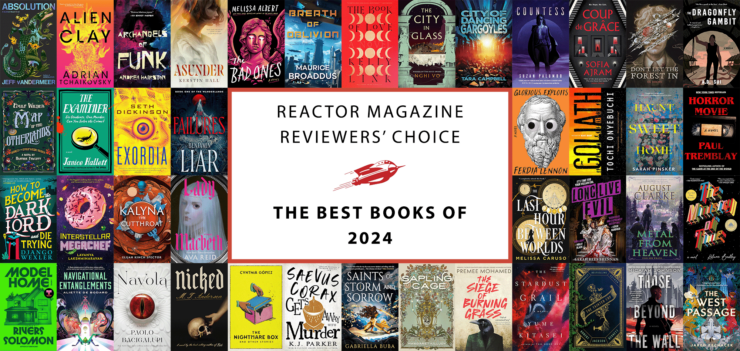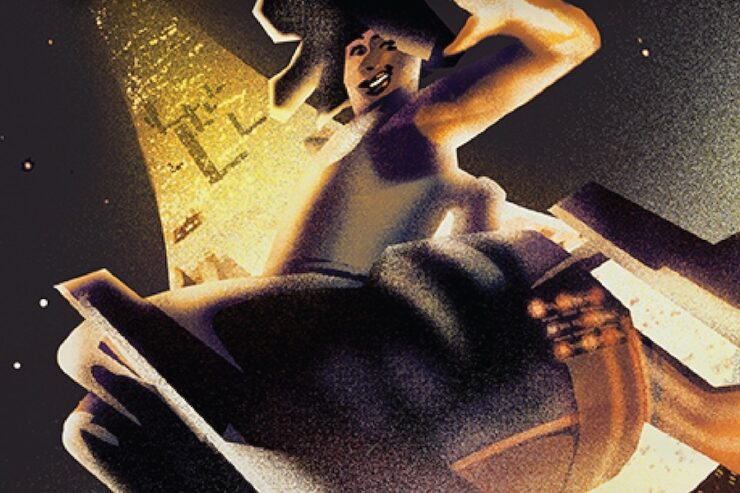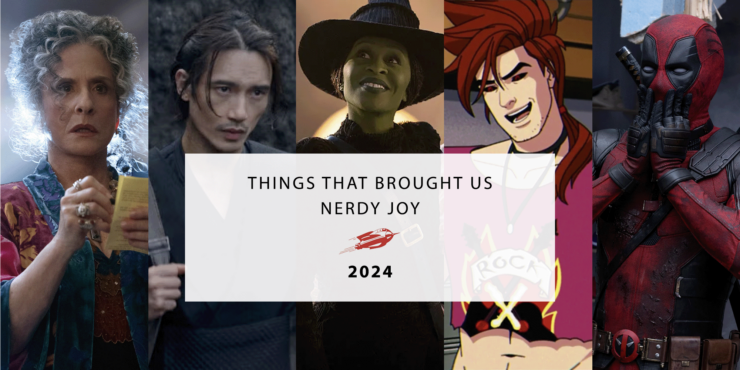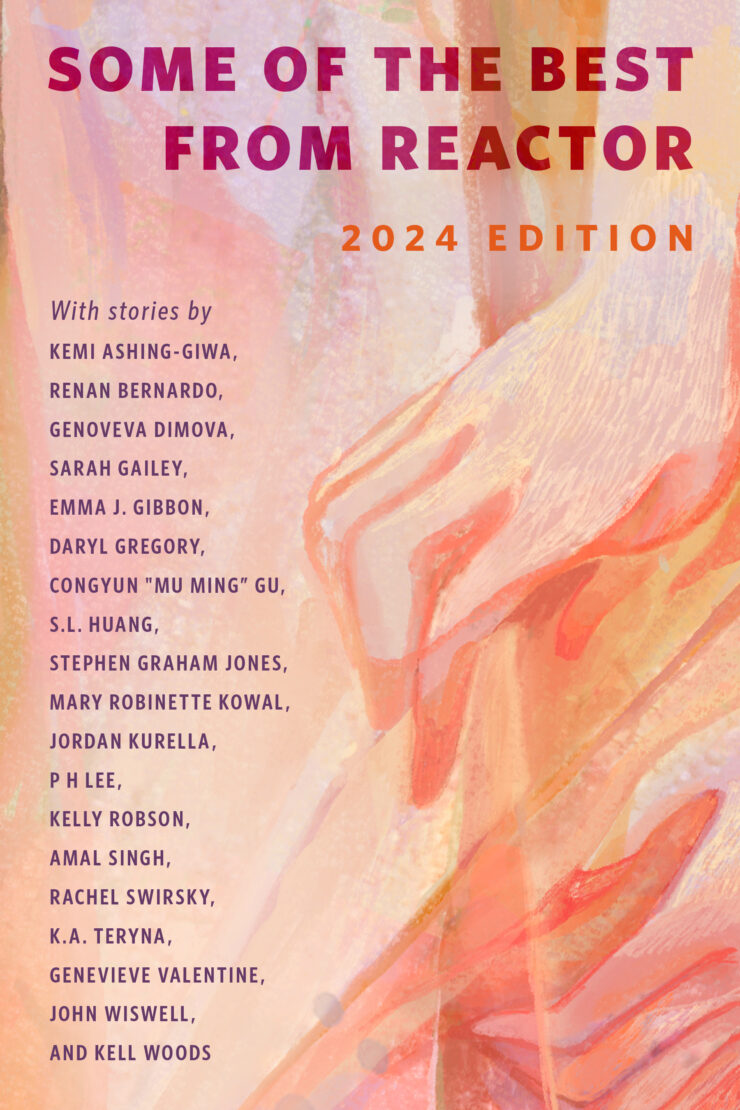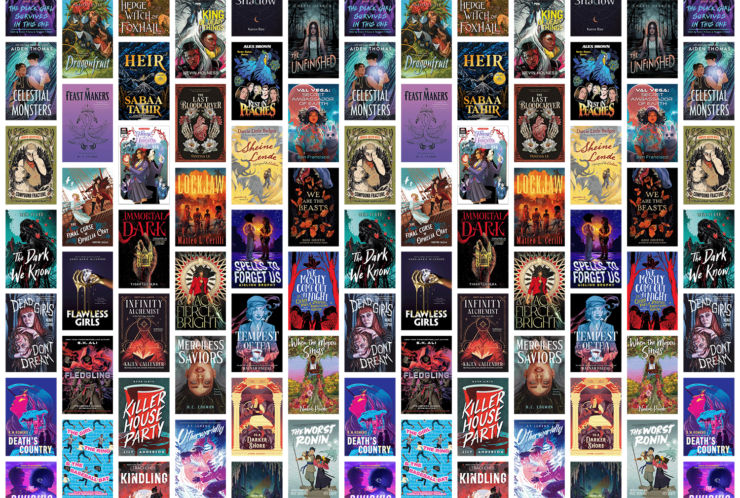As readers of speculative fiction, we are spoiled for choice. The book releases in the genres of science fiction, fantasy, horror, and beyond this year took us to lands of magic and wonder, newly terraformed planets and generation ships, crumbling gothic mansions, and tech-fueled future Earths—and we are so lucky to get to read them all. Our reviewers each picked their top contenders for the best books of the year, along with some personal favorites.
Below, Reactor’s regular book reviewers talk about notable titles they read in 2024—leave your own additions in the comments!
This was a year where I craved the whimsical, which made Emily Wilde’s Map of the Otherlands one of my favorite reads. Heather Fawcett’s sequel was just as enjoyable as the first book and excels at balancing worldbuilding with character development. I loved learning more about Emily and those in her life she ostensibly tries to keep at arm’s length, and I can’t wait for the third book in the series, which is set to come out this upcoming year.
Kaliane Bradley’s The Ministry of Time was an unexpected read that I enjoyed—I picked it up for the deft critique of colonialism explored via the trope of time travel and stayed for the steamy relationship between the narrator and the darkly sexy 19th-century arctic explorer who becomes her roommate. Not every book is both thoughtful and entertaining, but The Ministry of Time is one of those books that knocks both out of the park.
Some books stoke conversations, and some books are just plain good. Very good. Those Beyond the Wall by Micaiah Johnson is both of these things. The story takes place in the same world as Johnson’s previous novel, The Space Between Worlds, and is complementary rather than a sequel to that story. Beyond centers on Scales, who lives in the harsh desert land outside the walled city where the wealthy live. Through Scales, we experience the violence and support found in her community and how the injustices she and others in her town face spark a revolution. Her journey starts with a mystery—her friend dies in front of her, her body folding in on itself, bones breaking—and builds from there. You feel her anger and her pain, and the parallels of systemic oppression and disenfranchisement will reverberate through you long after reading.
I kicked my 2024 off with a bang by reading Seth Dickinson’s Exordia—a gorgeous, breakneck, incisive book that doesn’t pull any punches. Dickinson balances grim geopolitical realism with unnerving explorations (and distortions) of the human soul to create something overwhelming and exhilarating at the same time; once I started reading, I couldn’t stop simply because there’s no place to stop until you’re clear through to the end.
Benjamin Liar equally scratched my itch for epic stories with The Failures, a novel which takes on the classic heroes of children’s fantasy and inverts them for the adult reader. Children scattered throughout the massive, imposing Mountain are given dreams of adventures and relics to find—but that adventure turns too soon to real death, to real pain and real fire. Twenty years later, with the world still unsaved but their memories fresh, it’s no surprise they feel like failures.
2024 was also my year of mysteries. The Tainted Cup by Robert Jackson Bennett—already one of my favorite authors for his Foundryside series—was everything I wanted from a fantasy murder mystery: a reclusive detective and a put-upon assistant reminiscent of the Nero Wolfe series; powerful biochemical magic; and all-too-realistic bureaucracy. And despite my love for vast, world-shattering stories like the two above, I enjoyed that The Tainted Cup wasn’t that; with this first book in the Shadow of the Leviathan series, Bennett threads the needle of setting the mystery in a sprawling world without raising the stakes too far.
More of my mystery fix came from Janice Hallett’s The Examiner. I have a deep love for epistolary novels—I think it’s fascinating to build a story out of communications, to piece it together without a single narrator—and Hallett provides. Her newest mystery, following a small group of masters’ students through an intensive art program, and the growing suspicion on the part of their examiner that one of them is dead, is gripping and twisty.
This year I’ve missed more books than I’ve read, but I’ve read some brilliant ones.
My favourite novel of the year is Melissa Caruso’s The Last Hour Between Worlds. Its protagonist is an investigator and someone who retrieves people that have fallen down layers of reality—into the “Echoes,” as they are called. She’s also a new mother, escaping sleep deprivation and the constant demands of an infant to attend an end-of-year party. But the party is about to go horribly wrong, as it slips down through the Echoes towards an unsurvivable consummation. It’s up to our very tired hero—and her professional nemesis—to save as many people as they can. Fantastically compelling and enormously fun, I love it to pieces.
Kerstin Hall’s Asunder has slipped under a lot of radars. Written with precise and glittering prose and a deft eye for characterisation, its worldbuilding is complex and entertaining eldritch, while its protagonist keeps making terrible life choices on account of all the other ones are worse. Compelling, brilliant, weird: I will fight you for the sequel.
Aliette de Bodard’s Navigational Entanglements is my favourite SF story of the year. It has space jellyfish. And a misfit team, from rival clans, of people who (a) don’t like each other very much, and (b) are supposed to find and stop the space jellyfish before its escape turns into a mass casualty event. They like each other even less after their official leader turns up murdered in a locked room. They still have to work together. Romance, awkwardness, peril, adventure, mystery, self-realisation: It has it all.
Honourable mentions to Sophie Burnham’s debut SF novel Sargassa, set in a resurgent Roman empire, John Wiswell’s queer ace monster romance adventure debut, Someone You Can Build A Nest In, and debut writer Hana Lee’s Road to Ruin, a Mad Max: Fury Road-esque post-apocalyptic fantasy featuring impulsive decisions for the sake of love and survival; also to Jenn Lyons’ The Sky on Fire, a heist caper with dragons, and to The Book of Gold by Ruth Frances Long, which mixes magic, gods, and the inspirations of real 16th-century Antwerp to see a crew of thieves steal a very special book.
Let’s kick things off with the obvious picks. Of course Metal From Heaven by august clarke and The City in Glass by Nghi Vo are here. Their latest books were stunning literary achievements. The experience of reading these stories is as intense as the stories themselves. It felt like I was holding my breath the entire time. These books are gorgeous, lyrical, and relentless, and furious.
The novellas The Dragonfly Gambit by A. D. Sui and Countess by Suzan Palumbo are powerful and evocative stories about imperialism and the cost of revolution. Both feature women who had everything taken from them yet still fight back. I am obsessed with these books.
Tara Campbell’s City of Dancing Gargoyles tells the story of two sentient gargoyles, E and M, who set off in search of water and encounter strange cities with even stranger residents. It’s wonderfully surreal post-apocalyptic fantasy climate fiction. Cynthia Gómez’s The Nightmare Box and Other Stories collects 12 of her San Francisco Bay Area-centric horror stories. If you like horror short fiction, Gómez is a must-read author. I loved everything about this.
As per usual, I’m saving my favorite young adult speculative fiction for my Notable YA of 2024 list, coming soon to a Reactor near you. For a little taste: The Worst Ronin by Maggie Tokuda-Hall and Faith Schaffer, Dragonfruit by Makiia Lucier, and Rest in Peaches by Alex Brown (not me, the other one).
If someone asks for the definition of magic, hand them Kelly Link’s debut novel, The Book of Love. Tell them that by the end, you will not have THE definition of magic, but you will have so many beautiful definitions to choose from. Whimsical, sexy, unrelenting, oppressive, sorrowful, hilarious, real, unreal, quirky, joyous, stalwart, deadly, vicious, musical, romantic, all-powerful, quite small indeed, just a little to the right of what you’re looking at, Link lets us define magic how we want through one of my new favorite novels for life. A Katamari Damacy of everything that makes Link’s work so pivotal, legendary, and necessary to literature, that becomes even more than the sum of its parts with a literary voice that will shape generations. No matter where you land, The Book of Love is Magic incarnate.
Premee Mohamed has never been one to pull punches in her fiction, and in The Siege of Burning Grass, you can feel every bruise, every laceration, every flinch and wince and sob torn from the body of Alefret, as he is constantly abused for his pacifism. A grain of sand nestled between the gears of war, what can he do but survive with his moral code intact? Even when he is forced to violate it to hopefully end the war. Saddled with a bloodthirsty soldier drunk on toxic nationalism and boiling jingoism, Mohamed’s novel rings so boldly because at a certain point, the narrative stops trying to solve the war so much as it shrouds Alefret in the question of his life: Would he enact violence to end the greatest violence? What is the worth of peace if it is achieved through suffering? Mohamed takes that question, makes of it a trash compacter, and the beauty and horror of watching her push Alefret more and more towards answering that question makes this one of the finest I’ve read all year.
I’ll keep this brief. I’m this book’s publicist, so trust that I’m speaking as Marty, the reader and writer. Ahem. august clarke’s Metal From Heaven is one of my new favorite novels of my life. The prose. The plot. The characters. The world. Every single considered nuance, each acting as a puzzle piece of jagged glass—you will bleed from these pages, as you put the story together. And by the end, you will thank clarke for the chance to bleed for Marney, the Choir, and the Hereafter. Go forth and read. Let us contemplate the taste of Azurine, together.
God, this year has been good for books. Nghi Vo truly never misses; that’s a goddamn fact, always. But when she really hits, you don’t even feel the arrow go through you; you just feel the loss, and weep, looking back to see your heart has left your body, pierced by unimaginable sorrow and beauty. That’s The City in Glass. A story of a city, its demon, an angel, and the city that comes next. It is a tale of pasts and futures, how you don’t get to one from the other without pain and hard work. It is a tale of bindings and chains, those we choose and those inflicted upon us. It is a tale of eternity, and what lasts forever; like love and hate and that bittersweet third thing which is a child of both yet wholly apart. This is one of those stories that reminds me of why I read and why I write. If I can write anything a tenth as good as The City In Glass, I will count myself lucky.
I urge you to go forth and read these books, because I guarantee each will move you, change you, and remind you of the joy of reading. And especially as we head into a time of darkness, these books will remind you of that which stays, despite the frightening night: Magic. Joy. Goodness. Rage. And Stories. We will need each of these. We will need you. And we will need each other.
Special shout-out to the following: the delightful, monstrous Someone To Build A Nest In by John Wiswell, From These Dark Abodes by Lyndsie Manusos, Skin Thief: Stories by Suzan Palumbo, “Mammoth,” by Manish Melwani, “Why Don’t We Just Kill the Kid in the Omelas Hole?” by Isabel J. Kim, the surreal and haunting underworld of Animal Well, and the lush watercolors and wolven tale of Neva.
I wrote about Paul Tremblay’s Horror Movie and Rivers Solomon’s Model Home at length this year, and there’s a great reason for that; both tell stories that offer plausible supernatural and mundane explanations for something bizarre. In each case, the explanation that doesn’t involve the uncanny is no more comfortable than the prospect of eldritch intervention. Call it subtle horror; call it a whole subgenre riffing on this scene from Twin Peaks.
On the more overtly fantastical side of things, I ended up reading Jared Pechaček’s The West Passage and Margaret Killjoy’s The Sapling Cage in close proximity. Both are hugely compelling novels, and they felt like mirror images of each other in how they work in a seemingly familiar register right up until the point where they turn expectations on their head.
I want more books like CG Drews’ Don’t Let the Forest In, works of accessible, beautifully crafted art that explore specific identities at their intersection of trauma and desire.
I haven’t finished either yet, but shoutout to Gabrielle Buba’s Saints of Storm and Sorrow and Yume Kitasei’s The Stardust Grail for pulling me in so thoroughly I already know they’ll be favorites this year. A story of secret identity and concealed powers through a magical mixed kid’s double life—the narrative architecture of Filipino folklore crashing against the rise of colonial power—I’m obsessed and so glad there’s more of Buba’s story to come. And while I adored Kitasei’s debut The Deep Sky, I’m finding the anti-colonial interstellar reverse-Indiana Jones-esque adventure of The Stardust Grail even more of a delight. I’m so grateful for her voice!
Now, look. It didn’t come as a surprise, but Metal From Heaven is truly that bitch. Scapegracers is one of the coolest YA books I’ve ever had the pleasure of reading so I figured august clarke would blow me away with his adult debut… but I couldn’t have imagined the levels with which this came true. Gloriously sexy and utterly devastating, a hymn, a conjuring, a mesmer and a murmuration. Read it and rejoice and weep and worship. Fucky and metaphysical, to me personally it reads almost Joycean with pleasure and wreckage, louder and more literal with its urgent labor rights rhetoric, which is to say it’s maybe everything I’ve ever wanted in a book. Fucked me up. What a gift.
Set in the same world of multiverse travel and extreme income inequality as its predecessor, The Space Between Worlds, Micaiah Johnson’s Those Beyond the Wall follows an enforcer called Mr. Scales who becomes embroiled in a terrifying plan by the wealthy to push the poor out of the world (literally). This book is righteous in its anger and beautiful in its depiction of complex, troubled relationships.
Kaliane Bradley’s fantastic The Ministry of Time leans all the way into the weirdness of bringing people from the past into our current moment. Having reeled you in with the promise of time travel and kissing, it slowly reveals itself to be an immensely thoughtful story of complicity, power, and the function of individual choice within unjust systems.
My very favorite book of the year, though, has to be Ferdia Lennon’s Glorious Exploits. What can I say? I’m a sucker for a story about putting on a show. Glorious Exploits is a mad Irish novel set during the Peloponnesian War, when a pair of Syracusans realize they can experience a new Euripides play, despite the war with Athens, by employing the memories and acting talents of Athenian prisoners of war. Brutal, funny, painful. As soon as I finished, I wanted to turn back to the first page and read it all over again.
K.J. Parker’s Saevus Corax Gets Away with Murder offers a brisk and bleak conclusion to an enjoyable trilogy, while Sarah Pinsker’s Haunt Sweet Home is the perfect gentle story for a rough year.
M.T. Anderson’s adult debut Nicked fits an alternate history, a continent-spanning quest, a heist story, and a queer romance into two hundred swift pages; it’s a funny and heartfelt caper. Jeff VanderMeer’s Absolution is as good as everyone says; I’m guessing many of my fellow reviewers will have this on their end-of-year lists too.
Finally, the sequels to Paolo Bacigalupi’s Navola, the first volume in a new fantasy series, cannot come soon enough. I read Navola’s six hundred pages in just three or four sittings; I would gladly read another thousand.
Christina (Orlando, Reactor Books Editor) sent me the review copy of Ava Reid’s Lady Macbeth with the message ‘This goes SO hard, you’re gonna love it’. It does, and I did. This is a delicious gothic take on Shakespeare’s Macbeth, focussing on the titular character as she joins her new husband in his cold strange castle. Reid’s Scottish lord is a threatening mix of Bluebeard and Rochester: He’s got not one but three weird women hidden away. The young Lady Macbeth has to contend with her husband’s ambitions, her own survival, and all the secrets that simmer between them. Reid’s narrative is lush, dark and appropriately moody; the novel’s atmosphere is heavy and compelling, just like all those secrets. This isn’t the story of how Lady Macbeth became a villain, or an instigator of evil, but rather the story of a young woman’s acknowledgement and acceptance of her own feminine agency and power.
Another book that went really hard this year is Sofia Ajram’s horror novel Coup de Grâce, a successful experimental take on exploring mental illness and suicidal ideation. Ajram’s protagonist is on his way to end his life, when he exits his train and finds himself trapped in a seemingly labyrinthine Montreal underground Metro station. As he explores the physical manifestations of his fears and depression in the endless tunnels of the train station, he is forced to face his own shadow self, his own inner demons. The book plays with form and genre, often breaking the fourth wall, and even forcing the reader to make some narrative decisions, similar in places to a Choose Your Own Adventure Novel. It’s an incredibly immersive read, but sensitive, heartbreaking and hopeful too.
The City in Glass was my first Nghi Vo book, and I really don’t know why I hadn’t read her work before. She’s a wonderfully dynamic writer, and this novel was so powerful and fluid. This is the story of a city and a demon who loves it, lives for it, and would die for it again and again. But she isn’t ready to watch it fall, as it does when the angels come. The demon curses one of the angels as he walks away from the wreck of the city he has destroyed, and in doing so, she binds them to each other—by grief, by bitterness, by hatred and despair. And perhaps something else, too. In her attempts to rebuild the city, the demon has to rebuild parts of herself as well, but this time with the angel’s presence always with her, if not his physical self. The City in Glass is a glorious, strange love story—between a creator and her creation, between a demon and an angel, between two forces that are simultaneously attracted and repelled to each other. It is the story of life and death, love and indifference, desire and redemption.
And finally, Navola by Paolo Bacigalupi—this Machiavellian thriller has girth. Set in an alternate version of Renaissance Italy, it is built around a family of merchant bankers in the fictional city of Navola—the di Regulai, who (like the real life Medici of Florence), are heavily but indirectly involved in the politics of the city and beyond, thanks to their immense wealth. The scion of the family is young Davico, our narrator and erstwhile hero, who is forced to come of age as per plans his family has set up, with manipulations at a level that young Davico (and we) cannot imagine. Navola is a richly imagined and complex world, with subtle fantasy elements present throughout the story, but with the main thrust of the narrative being the political intrigues and power plays that surround the di Regulai and the city.
Sorry not sorry, but I’m going to talk about Asunder again. I cannot begin to list the things Kerstin Hall invents in this novel—including travel by spider, sort of—but it’s not just her creativity that makes this book so outstanding; it’s the layered, fraught, perfectly flawed relationships among all her characters, mostly of all Karys Eska, who talks to dead people, struggles with her past, and faces a truly uncertain future (which is to be expected when you’ve sold your soul to a devil AND there’s another consciousness taking up space in your brain). You can and should read this on its own, but you have to imagine me smashing my mug on the table, chanting, “SE! QUEL! SE! QUEL!” at the powers that be.
Another book that flew a bit under the radar is Andrea Hairston’s Archangels of Funk, which dances to its own fantastic—and, yes, funk-filled—rhythms. Truly: It took me a minute to be able to hear this book in my head, like I usually do, because Hairston’s prose has a different sort of musicality than I expected from a story set in the wake of the collapse of the world as we know it. But life goes on: People mourn their lost ones, teens make questionable choices, dogs are the best, and rich men keep thinking they can have whatever they want. Hairston makes art out of the familiar and the familiar into a new kind of science fiction—climate fiction, sure, but also a reminder that stories about technology can be intimate, personal, and infused with their own kind of magic. And that you can always dance.
I wrote about Rakesfall at least twice, so I’m going to talk about a different Vajra Chandrasekera work: “The Limner Wrings His Hands,” which appears in the anthology Deep Dream: Science Fiction Exploring the Future of Art. Listen: I fucking love this story, and I also think I might not be totally capable of understanding it. Maybe it’s just that it’s the end of the year and I feel like my brain is full of slugs. Maybe it’s that it works on more levels than I can comprehend without reading it a few more times. It’s about art, obviously; it’s about creation, complexity, meanings; it’s a meta-text in which the author is an artist is a monster, and all of those things are human. Chandrasekera has said, “I fully intend to cite forever as my main work of commentary on ’20s generative AI” and while I am certainly not going to put words in his mouth (or hands), as a commentary it’s fierce, sprawling, and inviting: You have to sit with this one and let all its shapes form in your brain. Your human brain. “The future of art is you, my love, always and only you.”
Is there room for deconstruction of the fantasy quest narrative in this modern age? Django Wexler, no stranger to writing epic fantasy, takes the assignment in stride with How to become the Dark Lord and Die Trying. Davi, having been caught in a time loop reset button of a couple of hundred tries at failing at being the chosen one, decides it is time to flip the script and try to be the Dark Lord instead. This does not go as well as she hoped, even with the “Reset button” as her ace in the hole. Pointed, extremely funny, self-aware and eminently readable.
Adrian Tchaikovsky continues to prove he is a certified virtuoso of interesting and strange alien environments and creatures in his stand alone space opera, Alien Clay. Exiled to a prison planet full of verdant and deadly alien life, Professor Arton Daghdev—xeno-ecologist and just as importantly, political dissident—winds up making contact with an alien ecosystem and an alien intelligence that has defied understanding from the tyrannical and narrow-minded Mandate of Earth. This is a novel that wears its politics of inclusion, adaptability and growth on its sleeve, while providing the strange and weird aliens that you come to expect from Tchaikovsky’s work.
Long Live Evil by Sarah Rees Brennan is another deconstruction of the fantasy quest narrative. Rae finds herself not in a mysterious fantasy land like Davi, and she doesn’t have the reset button… but she knows the novel she is in. Kind of. (She didn’t pay as much attention as she should). But when Rae finds that she is in the body of a character who is going to be killed the next day… Rae has to act fact to change the narrative of the book. And then finds, changing the narrative starts to unravel the other narrative threads of the book, even as she tries to keep her position and her plan in place. Funny, mordant, powerful and empowering. Rae is no damsel. She’s the villainess and knows it.
Can Maurice Broaddus’ Breath of Oblivion live up to its predecessor, Sweep of Stars? Second books in a chonky series, especially space opera, can be a tough act, but Broaddus rises to the occasion, building a bold and bright space opera that confidently tells the story of a new Afrofuturist spacefaring civilization, its triumphs, culture, society and its people, and then plunges that young and vibrant culture into what appears to be a series-spanning conflict that will certainly change the culture and the entire solar system in the process. Broaddus takes his story from Earth, to the stars, and back again in this second book in the series. Don’t start here, but after reading Sweep of Stars, boldly fly into this next volume, confident of the storyteller hitting on all cylinders. Think The Expanse meets Nnedi Okorafor, with Broaddus’ own rich style.
The high concept of Lavanya Lakshminarayan’s Interstellar Megachef makes it sound frothy and light: The Great British Bake Off in Space, Catherynne Valente and Cat Rambo in a blender set on high. And it is a lot of fun, as our main character Saraswati flees the backwater of Earth for the central and culturally powerful world of Primus, to compete on the titular cooking show to try and salvage her cooking career. But what starts off as seemingly a very cute and funny and light “cooking show in space” (complete with fuzzy AI companion, meet cutes and other shenanigans) gets a lot of extra notes and ballast as the narrative unfolds. Interstellar Megachef emerges, as well as maintaining its level of fun and frivolity as a consideration of cultural appropriation, family, found family, social dominance, bigotry, hatred, social expectations, the meaning of food (and food culture) and a lot more. I was left swimming in a raging sea of thoughts and considerations of how I view food and the simple act of consuming food of another culture now takes on a whole new meaning for me now after Lakshminarayan’s book.
I’ve been so fortunate to shout about books across several different websites at year-end that I don’t want to risk repeating myself too much. The Bad Ones is Melissa Albert’s best work yet, captivating you with its multigenerational take on urban legends while cutting to the heart of girlhood pacts and adolescent artistic collaboration. Equally ambitious in a different fashion is Elijah Kinch Spector’s standalone sequel Kalyna the Cutthroat, which expands both the world of the Tetrarchic Experiment and the heroine of Kalyna the Soothsayer through an entirely new (and just as compelling) character.
If anything, limiting my book choices allows me to recall the SFF short fiction that shaped my sense of the year. Endless Instagram scrolling has me wary of anything slapped with the label “viral,” but Isabel J. Kim’s sardonic Ursula K. Le Guin response story “Why Don’t We Just Kill the Kid in the Omelas Hole” (Clarkesworld) was exactly that communal shared experience, even (or especially) as readers’ reactions ran the gamut from praise to rebuff. Angela Liu’s “Before We Were Born“ (Logic(s)) puts a kid not in the Omelas hole but in a Life Machine that both extends and constrains her future under the watch of the people deciding her fate. In this beautiful tale, her mother briefly rents her body to her daughter’s consciousness; it made me bawl. And looking ahead to a lot of uncertainty and fear, Naomi Kritzer’s “The Year Without Sunshine“ (Uncanny Magazine) was a crucial reminder of all the ways that we have shown up for one another, and will continue to do so.










